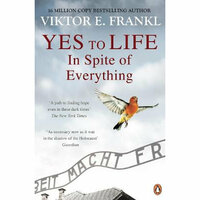Take a photo of a barcode or cover
I am humbled by someone who could survive the Nazi concentration camps with such grace, forgiveness and love for our species. That Frankl survived at all and was able to provide the world with such nourishing works is truly a gift. This book covers some of the same territory as Man’s Search for Meaning but is somewhat distilled (less of the horrid camp details), and instead touches on the obligation of the individual to answer their own questions regarding duty and meaning. I wish every human would read this book, I will be rereading it for years.
As it approaches the seventy-fifth anniversary of Victory in Europe (VE) Day, the day of Nazi Germany's surrender on 8 May 1945, there are myriad ways in which the population will be remembering those people actively involved in or lost to wartime activity yet this book looks at things from a fresh, amazing and quite frankly inspirational perspective. Viktor Frankl was a Holocaust survivor interned at Auschwitz in 1944 and who spent the remainder of his life attempting to make sense of what happened to him as well as searching for the meaning of life. His profound philosophical questioning led him to pursue a doctorate in philosophy in 1948 where existentialism was among his core beliefs. Viktor E. Frankl's ceaseless ability to see the light in the darkest of circumstances really shows how incredible a man he was. The lectures he prepared and presented way back in the forties, a mere few months after his liberation, have for the first been translated into English and delivered in this powerful, life-affirming 141-page book. His words and philosophy are as meaningful today as they were seventy-five years ago.
He has many valuable lessons to teach throughout this collection and despite losing his wife, mother, father and brother to the brutal Nazi regime he upheld a stoicism and resolve impossible to fathom having seen many atrocities of a bloody and genocidal war. It's times like these, when many societies around the world are in lockdown, we must remember that simply staying at home is nothing in comparison to what these survivors went through as they witnessed the horrors of Nazism and their evil ideology. Packed with wisdom, understanding and guidance this is a book that will never just be a product of its time and will benefit a multitude of people for a long time to come. It is a wonderfully insightful and well written book full of positivity and lessons on how resilience can be built through triumphing over adversity. But most of all it reminds us that hope can be found in these events we often deem as hopeless. Viktor passed on 2 September 1997 in his Austrian motherland but will undoubtedly be remembered for his timeless works. RIP Mr Frankl. Many thanks to Rider for an ARC.
He has many valuable lessons to teach throughout this collection and despite losing his wife, mother, father and brother to the brutal Nazi regime he upheld a stoicism and resolve impossible to fathom having seen many atrocities of a bloody and genocidal war. It's times like these, when many societies around the world are in lockdown, we must remember that simply staying at home is nothing in comparison to what these survivors went through as they witnessed the horrors of Nazism and their evil ideology. Packed with wisdom, understanding and guidance this is a book that will never just be a product of its time and will benefit a multitude of people for a long time to come. It is a wonderfully insightful and well written book full of positivity and lessons on how resilience can be built through triumphing over adversity. But most of all it reminds us that hope can be found in these events we often deem as hopeless. Viktor passed on 2 September 1997 in his Austrian motherland but will undoubtedly be remembered for his timeless works. RIP Mr Frankl. Many thanks to Rider for an ARC.
This is a remarkably current book, despite being based on a series of lectures delivered in 1946--a scant eleven months after the author was liberated from a Nazi concentration camp. The book is divided into three parts (not including intro and outro), in which Frankl builds on his subject of finding meaning in life. The first section is the heaviest going, feeling more like a philosophy lecture than the fresh immediacy evident in his most famous work, Man's Search for Meaning. Section one focuses on the value of life. The second section is decidedly snappier and deals with finding meaning in suffering. It is the final, third section which really sings for me. Here Frankl puts it all together and illustrates the ideas he has been developing with examples from his own life. And what a life. This is a man who proved that it is possible to choose your own responses even in the face of the unimaginable; it's safe to say he knows a thing or two about saying yes to life.

